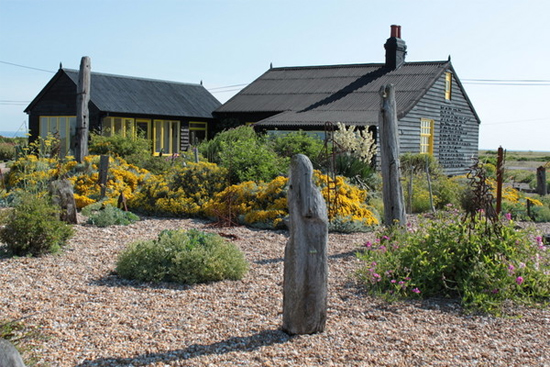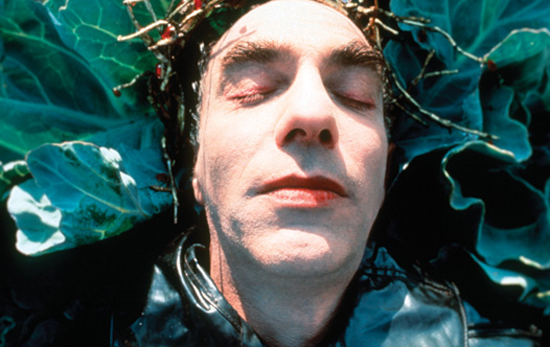My father Tom and I set off for Dungeness early. It was a cold grey Sunday morning, winter of 1991. I was fourteen and about to visit the abode of a strange English filmmaker and artist who lived in an equally bizarre location; stranger still that Dungeness was part of my native county of Kent, but seemed so incongruous compared to the woods and green rolling fields I was used to. It had to be seen to be believed.
I first discovered Derek Jarman through the Arena documentary A Portrait by Mark Kidel. My art teacher at school suggested I should see it. At the time I’d just purchased a Super 8 film camera and he thought I might find some inspiration there, as Derek’s first attempts at film were made using 8mm. The doc totally blew me away. Beautifully made, it centres around the making of The Garden (1990) and charts Derek’s life, work and battle with HIV. As fascinating as Derek was himself, Prospect Cottage, the garden and the landscape of Dungeness was equally inspiring. At the time I was big fan of Surrealism and Dadaism, particularly assemblage and collage, and the doc showed Derek making paintings from found objects, using rusted metal and large pieces of flotsam and jetsam erected into totem poles within the garden. I asked my father if we could visit Dungeness. I wanted to see for myself – this self exiled man of the sea and his pebble desert.
As Tom and I drove out, weaving between Kent and Sussex, we noticed the petrol tank was completely empty. Being a Sunday (and the early 90s) no petrol stations were open on the way. We listened to Penguin Cafe Orchestra, hoping the car wouldn’t conk out, but we managed to get to Rye to fill up before reaching Dungeness. As we approached, the surrounding landscape became more and more alien, akin to films I’d seen of Alaska or the Mojave desert. Robot pylons stalked the horizon, leading us ever closer towards the power station that dominates the Romney Marsh skyline. Driving onto Dungeness Road, I felt I’d finally entered a Terry Gilliam film set (the beach was actually used in the ‘Time of Legends’ sequence from Time Bandits), as the scene of weird little cottages, rotting boats, sheds and old winching gear surrounded my senses.
We pulled up outside Prospect Cottage, marvelling at the garden and house with the wind howling around us. To my pleasure and surprise, Derek could be seen in the right hand window, sitting at his desk, probably writing his journal exactly as I had seen him in the Arena doc. I desperately wanted to knock on the door, but we didn’t want to disturb his solitude. We spent the rest of our time taking photos and collecting objects, wood, chains, nails, fisherman’s cork floats and obscure melted objects which had forgotten their purpose long ago. I took these home, and began my own boxed assemblages combining paintings with these found objects. Our trips down there became more frequent, seeing the ness in all climes, even rare windless days of sun and unbelievable tranquility. We would see Derek out walking, collecting unwanted treasures, and once took photos of him returning home from London and running up to the cottage, a photo Tom would later use in a painting himself. As I became older Dungeness became a pilgrimage for me, and my other artistic friends were all obsessed with capturing its weird beauty.

In 1997 I was in my second year at The Slade School of Fine Art, where Derek had also schooled. Tom took early retirement the same year, and needed a change of scene to follow his dream of being a full time artist. That scene became Dungeness. He and my mother Liz found a cottage one door away from Prospect called Delhi Cottage, its frame made from a shipwreck called The City of Delhi. Over the years we became good friends with Derek’s boyfriend Keith Collins and finally got to visit the interior of Prospect and marvel at all the precious things. I even managed to kick over an inkwell of Derek’s as I signed a CD of my solo work for Keith; luckily he was more worried about my shoe than Derek’s floorboards, not that I spilled much, I might add. He also gifted our family with Derek’s painting cupboard, a gorgeous Georgian piece of furniture with slate shelves, something we all treasure to this day.
My parents recently moved further inland, but for seventeen years Dungeness was my retreat from the stress of London living: drawing on its power, taking night walks blanketed by stars, listening to music on my headphones soundtracking my fantastical journeys and inspiring ideas in a landscape where anything seemed possible. Recently Grumbling Fur, my band with Daniel O’Sullivan, recorded a song for the excellent Outer Church compilation. We are both fans of Derek and have a couple of copies of his Modern Nature journal lying around. Needing a title for this track, we opened the book containing entries on the filming of The Garden. The line "Tilda holds a sword and lilies" really struck a chord with us, and so became the title for this piece.
Music plays a central role in any Jarman film, with collaborations with Coil, Throbbing Gristle, Brian Eno and Simon Fisher Turner. These artists bridged the magical gap between the UK’s experimental music underground and avant garde film and art world, helping me to connect the dots between these transgressive mediums into an interlinked whole.
The impact of Derek Jarman and Dungeness is immeasurable in its influence on me, working its way through many of my songs, sound pieces, drawings, films and objects, and continuing to haunt my dreams and ideas to this day. Although I love Derek’s films, especially his Super 8 work, it has become the man himself and his garden that remain such an inspiration. In the Arena documentary, Derek says something along the lines of "Filmmaking is for fools… Now gardening – that’s the thing. It’s about cycles, returns and rebirth". Sometimes it’s not the art we make that contains the essence of our being, but the seeds we sow throughout our lives, through our words, ideas, actions and endeavours.
Derek Jarman: Queer Pagan Punk season is currently taking place at the BFI Southbank, and runs until 7th April. For the full list of film screenings and to buy tickets, click here.
Jarman’s film The Garden is showing at BFI Southbank on 9th March and 18th March. Click here for information and tickets.


